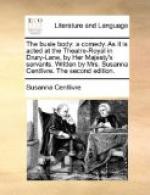* * * * *
To The
RIGHT HONOURABLE
JOHN Lord SOMMERS,
Lord-President of Her HAJESTY’s
most
Honourable Privy-Council.
May it please Your Lordship,
As it’s an Establish’d Custom in these latter Ages, for all Writers, particularly the Poetical, to shelter their Productions under the Protection of the most Distinguish’d, whose Approbation produces a kind of Inspiration, much superior to that which the Heathenish Poets pretended to derive from their Fictitious Apollo: So it was my Ambition to Address one of my weak Performances to Your Lordship, who, by Universal Consent, are justly allow’d to be the best Judge of all kinds of Writing.
I was indeed at first deterr’d from my Design, by a Thought that it might be accounted unpardonable Rudeness to obtrude a Trifle of this Nature to a Person, whose sublime Wisdom moderates that Council, which at this Critical Juncture, over-rules the Fate of all Europe. But then I was encourag’d by Reflecting, that Lelius and Scipio, the two greatest Men in their Time, among the Romans, both for Political and Military Virtues, in the height of their important Affairs, thought the Perusal and Improving of Terence’s Comedies the noblest way of Unbinding their Minds. I own I were guilty of the highest Vanity, should I presume to put my Composures in Parallel with those of that Celebrated Dramatist. But then again, I hope that Your Lordship’s native Goodness and Generosity, in Condescension to the Taste of the Best and Fairest part of the Town, who have been pleas’d to be diverted by the following SCENES, will excuse and overlook such Faults as your nicer Judgment might discern.
And here, my Lord, the Occasion seems fair for me to engage in a Panegyrick upon those Natural and Acquired Abilities, which so brightly Adorn your Person: But I shall resist that Temptation, being conscious of the Inequality of a Female Pen to so Masculine an Attempt; and having no other Ambition, than to Subscribe my self,
My Lord,
Your Lordship’s
Most
Humble and
Most
Obedient Servant,
SUSANNA CENTLIVRE.
PROLOGUE.
By the Author of TUNBRIDGE-WALKS.
Tho’ modern Prophets were expos’d of late,
The Author cou’d not Prophesie his Fate;
If with such Scenes an Audience had been Fir’d,
The Poet must have really been Inspir’d.
But these, alas! are Melancholy Days
For Modern Prophets, and for Modern Plays.
Yet since Prophetick Lyes please Fools o’Fashion,
And Women are so fond of Agitation;
To Men of Sense, I’ll Prophesie anew,
And tell you wond’rous things, that will prove
true:
Undaunted Collonels will to Camps repair,
Assur’d, there’ll be no Skirmishes
this Year;




